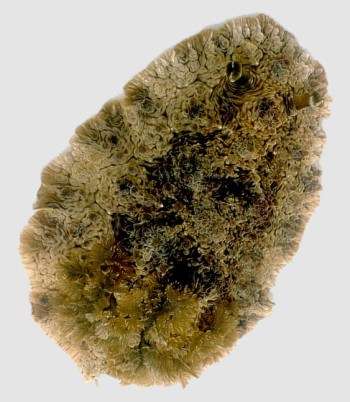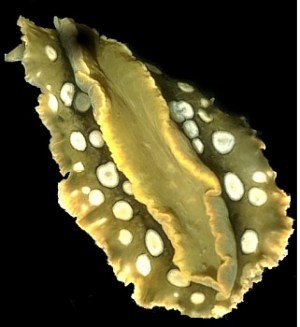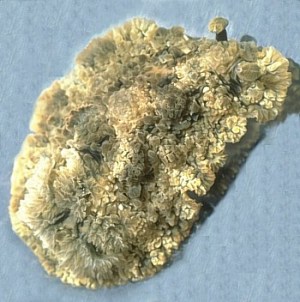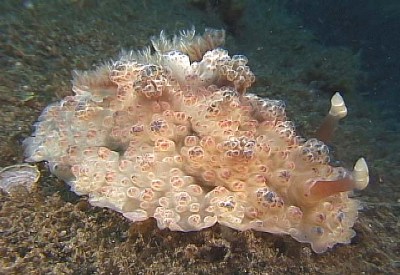
Dendrodoris tuberculosa
(Quoy & Gaimard, 1832)
Order: NUDIBRANCHIA
Suborder: DORIDINA
Superfamily: EUDORIDOIDEA
Family: Dendrodorididae
DISTRIBUTION
Tropical Indo-West Pacific
PHOTO
UPPER RIGHT: Inner Makatumbe Is, Dar es Salaam, Tanzania, November 1973, 3 animals - 90, 110, 135mm long, under stone, with bright yellow egg ribbons. PHOTO: W.B.RUDMAN,
BELOW: Dorsal and ventral view. Brooms Head, northern New South Wales, Australia, November 1986, 120mm long. PHOTO: J. Hunter & H. Woodward.
This large, strongly tuberculate dendrodorid is easily identified by the colour of the underside of the mantle, which has a background colour ranging from pale greenish or yellowish brown to dark brown with large round white spots. It is a widespread Indo-West Pacific species. The whole of the mantle is covered with tubercles. Usually these are simple rounded cones but scattered amongst them are large compound tubercles with conical tubercles arrayed all over the surface of the central projection. This can be compared with D. carbunculosa in which the mantle has large scattered tubercles, but the intervening spaces are smooth. In D. carbunculosa, each large tubercle has a ring of small basal tubercles, quite unlike the structure in D. tuberculosa.
See Page 2 for old illustrations.
Reference:
• Quoy, J.R. & Gaimard, J.P. (1832). Voyages de découvertes de l`Astrolabe pendant les annees 1826-1829 sous le commandement de M.J. Dumont d`Urville. Zoologie, 2: 1-686.


Rudman, W.B., 1999 (November 28) Dendrodoris tuberculosa (Quoy & Gaimard, 1832). [In] Sea Slug Forum. Australian Museum, Sydney. Available from http://www.seaslugforum.net/find/dendtube
Related messages
Dendrodoris tuberculosa ? from Vietnam
August 4, 2008
From: Hua Thai Tuyen

Concerning message #12381:
Is this Dendrodoris tuberculosa.?
Locality: Tre Island, 2 m, Vietnam, Algae. Length: 12 mm
Hua Thai Tuyen
hthaituyen@yahoo.com



Dear Tuyen,
I would agree that this is probably a juvenile Dendrodoris tuberculosa. In the close-up we can see how the tubercules are developing secondary tubercles all around the column. It would have been useful to have a photo of the underside to see if there are any traces of the white spots which are characteristic of this species. It does look quite like a juvenile D. denisoni, but the broken white line on the rhinophores of your animal [middle right photo] is more typical of D. tuberculosa.
Best wishes,
Bill Rudman
Dendrodoris from Hong Kong
September 21, 2007
From: Felix Poon

This orange-red seaslug was discovered inside a rock crevice. The rhinophores are lamellate, ribbed.
Locality: Bluff Island (Sha Tong Hau Shan), 6m, Hong Kong, Indo Pacific, 2 Sep 2007, Rock crevice. Length: 7 cm. Photographer: Felix Poon
Felix Poon
ifex@hotmail.com
Poon, F., 2007 (Sep 21) Dendrodoris from Hong Kong. [Message in] Sea Slug Forum. Australian Museum, Sydney. Available from http://www.seaslugforum.net/find/20653
Dear Felix,
I am pretty sure this is Dendrodoris tuberculosa. This species is rather variable in colour but we have an animal from South Africa on the Forum which could be a match for your animal [message #3503]. The only good way to be sure is to see if it has large white spots on the underside of the mantle.
Best wishes,
Bill Rudman
Dendrodoris tuberculosa from Indonesia
July 9, 2007
From: Judith Schuyf


I observed this quite large pink nudi; it looked almost like a small rug.
Locality: Nusa Kode Piramide, 12 metres, Indonesia , Flores Sea, 12 march 2007, coral reef. Length: 25 cm.. Photographer: Judith Schuyf.
Judith Schuyf
j.schuyf@planet.nl
Schuyf, J., 2007 (Jul 9) Dendrodoris tuberculosa from Indonesia. [Message in] Sea Slug Forum. Australian Museum, Sydney. Available from http://www.seaslugforum.net/find/20121
Dear Judith,
This is a species of Dendrodoris. It looks quite like both Dendrodoris tuberculosa and Dendrodoris carbunculosa but fortunately in Bruce Potter's earlier message #12381 he mentioned that his animal had white spots on the underside of the mantle which is a character of D. tuberculosa but not D. carbunculosa. So your animal is D. tuberculosa.
The animal in your second message, which I won't post, is a flatworm.
Best wishes,
Bill Rudman
Dendrodoris tuberculosa from Nth Sulawesi
March 9, 2007
From: Michael Henke

Dear Bill,
Again a nudi where I am not really sure what it is. My best guess is: Ceratosoma miamirana. I know, I should have had have a look under the mantle of this nudi to look for the characteristic pattern, but now it's too late.
Locality: P. Talis, 6 m, North Sulawesi, Indo Pacific, 05 November 2006, top of reef, near drop of. Length: 10 cm. Photographer: Michael Henke.
Thanks for your time.
Best wishes
Michael
henke@seddoc.de



Dear Mike,
Luckily Bruce Potter [message #12381] had a look under the mantle of an animal with the same colour pattern and tubercles as this and found the characteristic white spots of Dendrodoris tuberculosa.
Best wishes,
Bill Rudman
Dendrodoris tuberculosa from East Kalimantan
July 31, 2006
From: Claus Gregersen

Dear Bill
I swear, I've (almost) clicked through your entire database as well as various books on the subject but I haven't been able to possitively identify the attached slug.
Locality: Kakaban Island, Berau District, 5-6 metres, East Kalimantan, Indonesia, Indo-Pacific, 25 September 2002, Hard and soft coral covered. Length: About 8-10 cm. Photographer: Claus Gregersen.
I'm afraid I can supply these low-res video grabs only - unless you want the live footage, of course.
The colours in the photos are quite true to life. One thing, you'll notice, are the ball-pointed rhinophores. In one picture the left rhinophore is retracted leaving only the ball visible.
Trust you can help :-)
Best wishes
Claus
e-mail@kofte.dk
Gregersen, Claus, 2006 (Jul 31) Dendrodoris tuberculosa from East Kalimantan. [Message in] Sea Slug Forum. Australian Museum, Sydney. Available from http://www.seaslugforum.net/find/17123
Dear Claus,
This is Dendrodoris tuberculosa. It is a very well camouflaged species and as you will see on the Fact Sheet, its most distinctive feature is the presence of opaque white spots on the underside of the mantle - which of course don't appear in photos. Have a look at Carmen Loke's recent message [#17135] which shows a rather colorful variety. I note there, as you do, how distinctive the rhinophore clubs are.
Best wishes,
Bill Rudman
Dendrodoris tuberculosa from South China Sea
July 17, 2006
From: Carmen Loke

HI,
Can you please help me to identify this beautiful slug found in Pulau Dayang, East Malaysia. It was just gliding across the rocky coral bed, looking for food. It's back is filled with little cauliflower-like warts. It was about 10cm big, at about 10m depth. Is this a Pleurobranchus?
Locality: Pulau Dayang, 10, East Malaysia, South China Seas, 30 April 2006, Channel. Length: 10cm. Photographer: Carmen Loke.
Appreciate your help.
Carmen
carmenloke@hotmail.com



Dear Carmen,
This is Dendrodoris tuberculosa, which is a dorid nudibranch rather then a pleurobranch. Pleurobranchs, which are often called 'side-gilled' slugs, have a single gill on the right side of the body below the mantle skirt. Your animal has a very obvious set of gills on its back, near the posterior end, which is a character of dorid nudibranchs. It also has large rhinophores with the sensory club perched almost at right-angles on top of the stalk, a shape which is found in a number of large species of Dendrodoris such as D. tuberculosa and D. carbunculosa. In an earlier message about a very similarly coloured specimen from Sth Korea [#7605], I said it was not possible to be sure of its identity without some information on the colour of the underside of the mantle, because one species, D. tuberculosa, has very characteristic white spots, which are absent in a second species, D. carbunculosa. Fortunately we have a later message from Bruce Potter from the Solomons [#12381] in which he turned his animal over and reported white spots, So like his animal I am pretty sure yours is D. tuberculosa.
Best wishes,
Bill Rudman
Dendrodoris tuberculosa from India
March 7, 2006
From: Deepak Apte

Can you confirm if the enclosed species is Dendrodoris tuberculosa?
Locality: Lakshadweep, 1m, India, Arabian Sea, 1st Jan 2006, Reef sand. Length: 130mm. Photographer: Deepak Apte.
Deepak Apte
bnhs_conservation@vsnl.net
Apte, D.A., 2006 (Mar 7) Dendrodoris tuberculosa from India. [Message in] Sea Slug Forum. Australian Museum, Sydney. Available from http://www.seaslugforum.net/find/16023
Dear Deepak,
Yes this is Dendrodoris tuberculosa. As we can see in your photo, the upper side is often very well camouflaged, but the white spots on the underside are very characteristic of the species
Best wishes,
Bill Rudman
Dendrodoris tuberculosa from Egypt
July 11, 2005
From: Natasja Krüger

Does anyone know the name of this big nudibranch? I saw it in a morning dive near Marsa Alam.
Locality: Marsa el Shona (Marsa Alam), Egypt, Red Sea. Depth: 10 m. Length: 20-25 cm. 08 June 2005. Sandy bottom. Photographer: N.S. Krüger
Regards,
N. Krüger
natasjakruger@yahoo.com
Krüger, N.S., 2005 (Jul 11) Dendrodoris tuberculosa from Egypt. [Message in] Sea Slug Forum. Australian Museum, Sydney. Available from http://www.seaslugforum.net/find/14236
Dear Natasja,
This is Dendrodoris tuberculosa. By coincidence I am posting a message today [#14223] about a similar large dendrodorid from the Caribbean region, Dendrodoris warta. It's interesting how both these species, and a third large one, D. carbunculosa, all have strangely shaped rhinophores in which the rhinophore club sits almost at right angles to the stalk. IN the close-up alongside you can see the prominent compound tubercles which give this species its name.
Best wishes,
Bill Rudman
Dendrodoris tuberculosa from Reunion Island
February 23, 2005
From: Philibert Bidgrain


Dear Bill,
Reunion Island sea slugs.
These animals were observed and photographed by Maurice Jay
The upper two photos are of a specimen found at "Grand Fond" lagoon in Saint Paul, 16 March 1985, size: 80 mm x 60 mm. The underside of the mantle has a dark brown background colour with large round white spots, characteristic of Dendrodoris tuberculosa.
For the animal in the third photo [alongside Bill's comments] I don't have an underside view, and so I am not sure that it is the same species... May be a juvenile form?
Best Regards
Philibert Bidgrain
http://vieoceane.free.fr/runseaslug/indexslug.htm
pbidgrain@yahoo.fr
Bidgrain, P., 2005 (Feb 23) Dendrodoris tuberculosa from Reunion Island. [Message in] Sea Slug Forum. Australian Museum, Sydney. Available from http://www.seaslugforum.net/find/13162
Dear Philibert,
The upper animal is indeed Dendrodoris tuberculosa - the spots on the underside are very characteristic. I am pretty sure the lower photo is nont this species. It is a bit hard to be sure from the photo but I suspect it is a species of Actinocyclus. At the moment in the Forum I have only one species of Actinocyclus - another little thing I need to fix up when they invent 36 hour days.
Best wishes,
Bill Rudman
Dendrodoris tuberculosa from the Solomon Ids
March 26, 2004
From: Bruce Potter

Bill,
Last night I dived a site on the outskirts of Honiara. this is a coral and rubble and sand site.
At about 16 meters I came across this beautiful Dendrodoris tuberculosa. It was about 80mm long. I remember a comment that you made previously about this critter having white spots underneath it's body, so I subjected it to the indignity of being turned over and sure enough there were large white spots underneath. It was crawling across the sand when I found it.
Regards
Bruce Potter.
bac@solomon.com.sb


Thanks Bruce,
My first thought on seeing the photo was about the colour of the underside of the mantle. I assure you the slight indignity it suffered was all in the cause of science. Usually this species is a dull and cryptically coloured. The multi-coloured animal in your photo is similar to one in an earlier message of yours [#2946] and also to one from Sulawesi [#2539]. It is easy to suggest mimicry and camouflage, but difficult to prove. However, perhaps this is a form attempting to mimic a softcoral colony?
Best wishes
Bill Rudman
Dendrodoris tuberculosa from Thailand
March 13, 2003
From: Phil Humphreys

Hi Bill,
Took the attached photo on Xmas day while diving Maya Wall, Koh Phi Phi, Thailand [25 December 2002].
Actual depth not recorded but max depth 17.9m, with average depth of 12.1m.
We have not been able to identify it but believe it may be a Dendrodoris. Can you help? Apparent size 13 x 8cm.
Regards
Phil Humphreys
phumphreys9@aol.com
Humphreys, P., 2003 (Mar 13) Dendrodoris tuberculosa from Thailand. [Message in] Sea Slug Forum. Australian Museum, Sydney. Available from http://www.seaslugforum.net/find/9276Dear Phil,
This is definitely a Dendrodoris and almost certainly Dendrodoris tuberculosa. If you have a look at the species Fact Sheet, you will see from the photos that the easiest way to identify this species is by the white spots under the mantle skirt. Not the easiest thing to see in a photo from above!
Best wishes,
Bill Rudman
Dendrodoris tuberculosa from Lord Howe Island
January 17, 2003
From: W.B. Rudman

Here is a photo record from Ian Hutton of Dendrodoris tuberculosa from Lord Howe Island.
Location: Neds Beach.
I have included a close-up of the anterior end showing a couple of the compound tubercles and the rhinophore clubs more clearly.
Bill Rudman


Dendrodoris carbunculosa? from Sth Korea
July 26, 2002
From: Dong Bum, Koh

Dear Bill,
This is a photo of another Dendrodoris species for the Forum.
Thanks a lot for your help.
Mun islet of CheJu Island, Sth Korea, 7 m depth. Feb.2002. Photos: Dong Bum,Koh
Best wishes,
Dong Bum, Koh
drkoh@seasee.co.kr
Koh, D.B., 2002 (Jul 26) Dendrodoris carbunculosa? from Sth Korea. [Message in] Sea Slug Forum. Australian Museum, Sydney. Available from http://www.seaslugforum.net/find/7605Note added 14 July 2006: This must be D. tuberculosa. See Bruce Potter's message from the Solomons [#12381] reporting that this colour form has white spots on the underside of the mantle.
Dear Dong Bum,
I suspect this is a form of either Dendrodoris tuberculosa or Dendrodoris carbunculosa. Is it quite small? perhaps it is a juvenile colour form. Since the tubercles on the mantle are not very typical it is difficult to use them to determine what species it is, so perhaps you can remember whether the ventral side of the mantle had large white spots or not. If it did it would suggest that it is D. tuberculosa.
Best wishes,
Bill Rudman
Dendrodoris tuberculosa from South Africa
June 1, 2001
From: Valda Fraser


Dear Bill
Sorry about the jig-saw, but what could I do? This one was too big for my framer. I was stunned by the beauty of it's underside. Just as well I decided to flip it over. It was hiding under a dead coral slab.
Locality: Park Rynie, south coast KwaZulu-Natal, SOUTH AFRICA, 28m
Date: Jan 2001
Size 110mm
Thanks.
Valda
valda fraser@mweb.co.za
Fraser, V., 2001 (Jun 1) Dendrodoris tuberculosa from South Africa. [Message in] Sea Slug Forum. Australian Museum, Sydney. Available from http://www.seaslugforum.net/find/3503Dear Valda,
This is one of the big dull dorids which gives youa real surprise when you turn it over and see the characteristic white spots on the underside of the mantle. It is a species of Dendrodoris, Dendrodoris tuberculosa, which is found throughout the Indo-West Pacific. Your upper photo shows the compound tubercles very well.
Best wishes,
Bill Rudman
Dendrodoris from Solomon Ids
August 31, 2000
From: Bruce Potter

Dear Bill,
I have included another Nudibranch with this Email. The only thing I can find in any of my books like it is a Dendrodoris tuberculosa. In most of my books the D. tuberculosa is quite different, but there is one from Japan which is a bit like this beast. It was about 11cm long, and very attractive compared with most of the photo's of D. tuberculosa I have seen.
Thank you for your interest in what I have sent you. And thanks for your offer of Web information. I have this week decided that I must connect to the Web myself, so have now got myself a Web address, so will be able to log onto your site for further information.
Thanks again
Bruce Potter.
bruce.potter@adventist.org.sb
Potter, B., 2000 (Aug 31) Dendrodoris from Solomon Ids. [Message in] Sea Slug Forum. Australian Museum, Sydney. Available from http://www.seaslugforum.net/find/2946Dear Bruce,
I a pretty sure you are right in identifyng this as Dendrodoris tuberculosa. It is indeed prettier than 'normal' specimens, but the shape of the tubercles and the rhinophores are very characteristic of this species. Another species he has often been confused with is Dendrodoris carbunculosa. One other good sign of D. tuberculosa which I can't see in the photo, are large white spots on the underside of the mantle, which you may remember seeing, as they are quite spectacular.
Best wishes,
Bill Rudman.
Dendrodoris tuberculosa from Sulawesi
June 13, 2000
From: Ray Izumi

Dear Bill,
Here is one of two nudies I found in the Lembeh Straits [Sulawesi, Indonesia] during May of this year. They were on a sandy / silty bottom at about 40-50 feet, water temp 82 degrees F, no current to speak of. The orange and spotted one was found at about 8PM, this one was found during the afternoon. Does anybody recognize it?
Ray Izumi
izumirm@sprynet.com
Izumi, R., 2000 (Jun 13) Dendrodoris tuberculosa from Sulawesi. [Message in] Sea Slug Forum. Australian Museum, Sydney. Available from http://www.seaslugforum.net/find/2539Dear Ray,
This is Dendrodoris tuberculosa which is found throughout the Indo-West Pacific. One quick way to identify it is to look on the underside of the mantle (difficult in a photo I must admit) where there are scattered large white spots.
Your other species is another species of Dendrodoris, Dendrodoris guttata.
Best wishes,
Bill Rudman.
